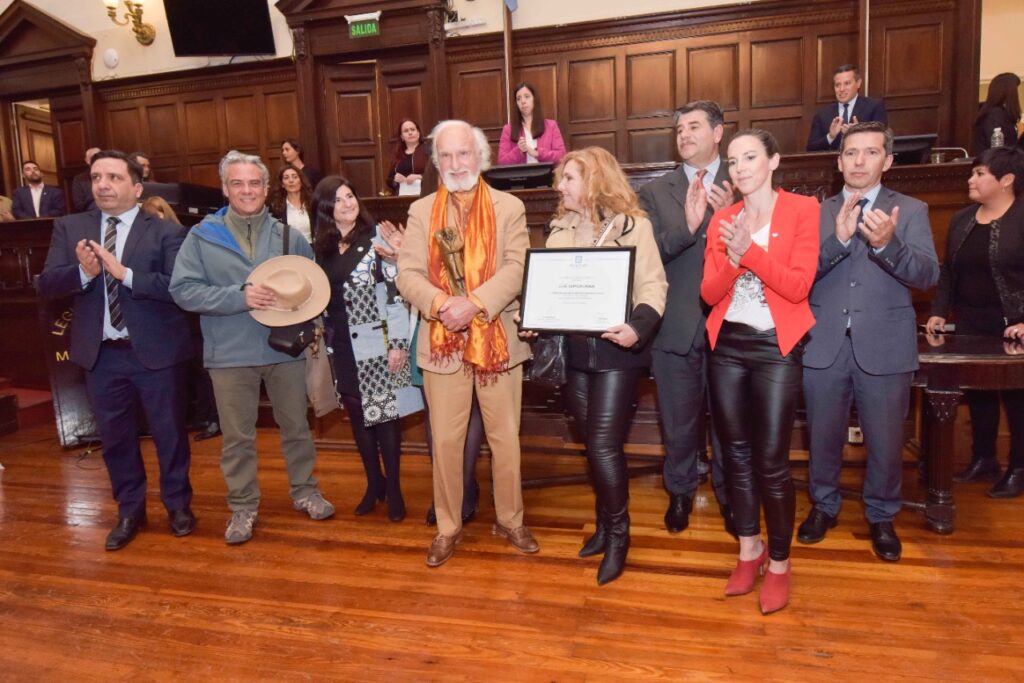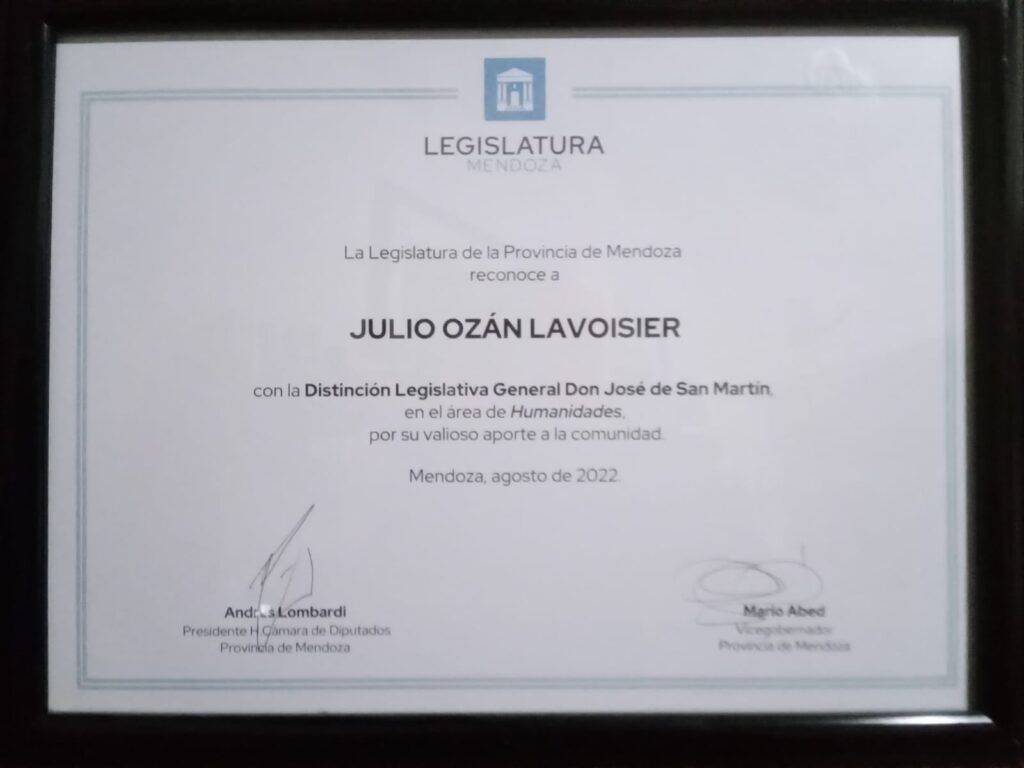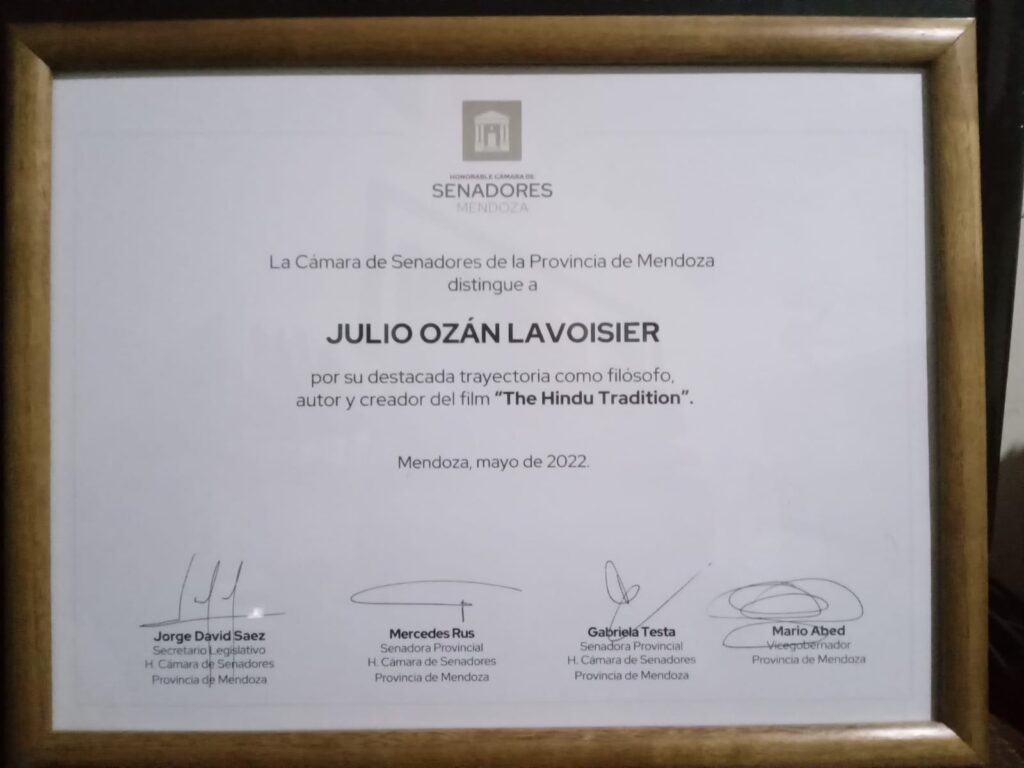One has to be very careful not to be domesticated by leading a domestic life.
Inicio » About the author
Lastest news
RareBiblio, a prestigious bookstore in the United Kingdom, lists THE SEARCH FOR UNIVERSAL CONSCIOUSNESS by Motilal Banarsidass Publishers of New Delhi as a bestseller due to high recommendations from readers worldwide.
About the Author
He was born in 1940 in Mendoza, Argentina
Belonging to cultured and traditional family, he received a careful education.
He studied law at the University of Cordoba, Argentina and later philosophy at the National University of Cuyo, Argentina, and then in Aix-en-Provence, France, but not satisfied with the structures of the academic studies, he did his own search in a life rich in experiences and studying the authors according to his personal concerns.
He sailed for 12 years aboard an old wooden sailboat; this allowed him to meet diverse and remote cultures, which has always been his passion.
In San Francisco (USA), was part of the countercultural movement of the 60s. Then he moved to Sierra Nevada (Spain), to the ranch Ken (La quietud), “the highest in Spain”, where he lived for 15 years dedicated to reflection, contemplation and study. The last twenty years he has resided in Rancho Kuan, “La contemplación”, in a house of stone and wood that he build, already covered with flowers among the 400 trees that he has planted, at the foot of the mountain range Los Andes, in Mendoza, Argentina.
This retired life has been complemented by prolonged stays in India, which has allowed him to know the varied expressions of that civilization, as is evident in his work.
Lavoisier has commented on his extensive work the most outstanding thinkers of East and West in the light of his own experience. Of his lectures deserve to stand out those given at the Seminar and Festival of India, Pacific Galeries, Buenos Aires, 2009; in India International Centre, Delhi, 2015 and 2016; in University of Nalanda, Bihar, India 2018, about the Dahrma-Dhamma.
Ozan Lavoisier is an expositor of what he has called universal idealism, represented in the West by Platonism and in the East by Hinduism and Buddhism; hence his interest in establishing a relationship between these doctrines, which he examines in the light of his own philosophy. Being a mystical philosopher he sees no opposition between religion and philosophy, but rather finds in them the same origin and a common destiny.
His philosophy finds its inspiration in the spiritual experience, which is achieved through psychic balance and harmonious integration of all faculties. The originality of his thought is manifested in his particular vision of the psyche, developed in his Psychosophy, in which he explains its transcendent mission and exposes the mechanisms that govern the mind. However, his transcendental psychology is only a practical aspect within the broad spectrum of his philosophy that finds a metaphysical foundation, expressed in his theory of knowledge, his ethics, his aesthetics and his philosophy of history, which constitutes a remarkable philosophical system coherent and structured. Its philosophy is essentially vital; its purpose is to generate the spiritual conditions to experience the essence of life. His ultimate goal is the bliss of freedom.
His admiration for Indian civilization has recently led him to make an extensive documentary film (24 episodes) called The Hindu Tradition. The editor of the work of Ozan Lavoisier in Delhi, Har Anand Publishers, and the Argentine ambassador in India, (Cervantes Institute, Dec. 2015), have presented the author as “The first Latin American philosopher published in India.“
Concepts
Universal Consciousness. The concept of universal Consciousness is the main idea of the philosophical system of Julio Ozán Lavoisier. “From the psycho-philosophical point of view we can say that there is a universal Consciousness of which man is a part and from which he can participate, so that just as his psyche can know the multiplicity, he can know the Unity, which is the core of that Consciousness.” (Origin and Destiny of Man, 2008) “From the cosmological point of view, the universal Consciousness is the beginning, middle and end of the existence, it is the Life itself of all things, the process that is permanent and at the ends of which the cycle of life begins and ends.” In his work The Quest for Consciousness the author develops in detail the concept of universal Consciousness, as well as its manifestations in the World.
Psychosophy (as published by Dharmapedia Wiki, India)
According to the philosopher Julio Ozan Lavoisier, in his book The Return to the Sources (Editorial Rueda, Madrid, 1993, Psychosophy: “it is a knowledge of the first causes, which aims at the plenitude of human beings and their integration in the World through the unification of the mind”.[2] A basic principle of this discipline is that “psychic balance and moral balance are consecutive.” Nevertheless, it does not deal with personal or subjective problems, as it may only bloom in mature spirits. Therefore, “Psychosophy starts where psychology ends.” “Psychosophy starts from an essential perspective (for which the author has developed a theory of perspective within his theory of knowledge), not from what has been revealed but from what is revealing” (Op. Cit.).
Eleven years later, Ozan Lavoisier published Psychosophy. Psycho-philosophical research on the nature of human beings, (Editorial Dunquen, Buenos Aires, 2004) a thick volume in which he elaborates upon his method of knowledge in detail. He makes clear that his discipline is not in search of news, but “perennial truths found in ancient traditions.” It is essentially “a philosophy that makes use of transcendental psychology in order to provide grounds for a metaphysics, ethics, aesthetics, a theory of knowledge and a philosophy of history, that is to say, a philosophical system,” (developed in nine treatises).
Therefore, the concept of Psychosophy, according to Ozan Lavoisier, should be interpreted in the context of this system, independently of other views or schools that have adopted this concept later and applied in the field of psychology.
Universal idealism. This concept designates, within the philosophical system of Julio Ozán Lavoisier, “the highest peaks of thought: Platonism, neo-Platonism, Indian Mahayana Buddhism, Shankara’s Vedanta.” “The Idea that inspires them is the fruit of a high level of consciousness, which has allowed them to observe reality from these summits.” (The Spirit in History, 2011). In his work The Quest for Conscience, the author traces the development of this concept from Plato to his own philosophy, which aims to summarize and integrate the long and varied search of the idealists. This lineage “is not due to a cultural heritage but the product of a similar spiritual experience, which allows its reappearance and transmission.“
Idealism and Neo Renaissance in the West
In the development of his system, Ozan Lavoisier stands out as “restorer of Idealism in the West,which had fallen into disrepute and oblivion for two centuries due to the artificial idealism of Hegel”. His philosophy leads to a high level of consciousness for which is essential the practice of virtues and the humanist disciplines; hence his social proposal of a Neo Renaissance
Synthesis of my Project
My whole life has been a search for the sources; all my work is an expression of this Origin, from the First Principle, which is the basic subject and principal of philosophy, as Aristotle had earlier observed.
Human beings take part in this search, even if the majority does so unconsciously; it is the task for philosophers to do so consciously in order to take back the spirit to this Origin. Scientists have also made significant advances in this sense, but as they cannot transcend the material world, they are very limited and very distant from the Principle that is of a spiritual and transcendent nature.
I am convinced that I have found the First Principle; my whole philosophy derives from this. It is not possible to explain in a few words what this Principle is; I have tried to do so in various works. On the other hand, the concepts that define it are not very useful, as one is dealing with a vital experience. For this reason most of my work is directed to producing this experience showing the access routes, the paths that lead to it, as well as the usual obstacles that impede the ascent of the spirit towards this basic reality.
For this reason I have believed it necessary to follow the trajectory of idealist thought of the West as well as that of the East; I am referring in particular to Platonism and Neo-Platonism, as well as to Mahayana Buddhism and to Vedanta with the objective of comparing these doctrines and explaining them from a unifying perspective or vision. These traditions converge in my philosophy, as I start from the Origin that generates them and its manifestations. We are not talking about a syncretism but of a similar experience of the principle that underlies and explains them. (Parallel Civilizations)
This convergence is the result of a long search, not just on my part but from the human spirit in its millenarian development to find the principle of life and give meaning to our existence. (Origin and Destiny of Man; The Evolution of the Spirit)
This convergence and synthesis are grounded on a theory of knowledge that involves a particular vision of the mind and a transcendental psychology, as well as a unitive method, (Psiychosophy, Psycho-philosophical Investigations into Human Nature); through a philosophy of history (The Spirit in History); and an ethics that tends to demonstrate the common origin and the fraternity of all living beings (The Roots of Moral); through an aesthetics with the purpose of making us see the beauty of the World in its primordial unity (The Roots of Art) and a metaphysics that includes a religious vision (The Quest for Consciousness); all of which constitute a philosophical system that cover my thought and the aforesaid traditions. In fact everything is taken over by a universal Consciousness, the origin, basis and destiny of all beings, from whose knowledge and harmonious integration of all human faculties derives the freedom of the spirit and consequently intrinsic happiness, i.e. true and real.
Julio Ozán was distinguished by the Chamber of Senators of Mendoza with the "Distinción Sanmartiniana"




